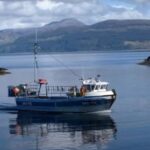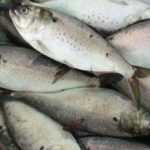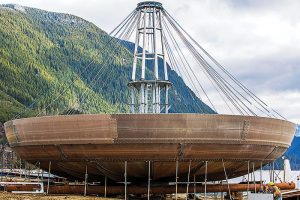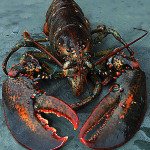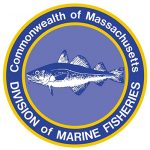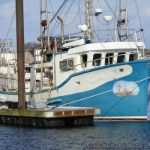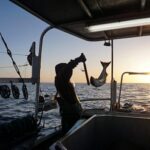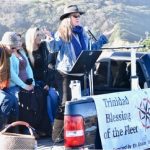Monthly Archives: March 2016
Native Fishermen’s Group Seeks To Close Unalaska Bay To Commercial Trawl Fishing
 A proposal to permanently close Unalaska Bay to commercial trawl fishing is up for discussion at an upcoming Alaska Board of Fisheries meeting. The statewide meeting takes place the second week of March in Anchorage, and Qawalangin tribal president Tom Robinson will be there to testify. He will be speaking on behalf of the (UNFA). Robinson says this is UNFA’s third attempt since 2008 to get the proposal – numbered 194 – passed by the Board. In 2013, the Unalaska City Council passed a resolution supporting the plan to close Unalaska Bay to groundfish fishing with trawl gear year-round. Read the rest here 08:29
A proposal to permanently close Unalaska Bay to commercial trawl fishing is up for discussion at an upcoming Alaska Board of Fisheries meeting. The statewide meeting takes place the second week of March in Anchorage, and Qawalangin tribal president Tom Robinson will be there to testify. He will be speaking on behalf of the (UNFA). Robinson says this is UNFA’s third attempt since 2008 to get the proposal – numbered 194 – passed by the Board. In 2013, the Unalaska City Council passed a resolution supporting the plan to close Unalaska Bay to groundfish fishing with trawl gear year-round. Read the rest here 08:29
New Bedford fisherman’s arrest puts spotlight on industry’s quota questions
 When local fishing kingpin met last June with undercover agents posing as members of Russian organized crime, Rafael named an incredibly lofty price for his commercial fishing operation. $175 million. The price covered more than 40 boats and the Carlos Seafood business on New Bedford’s waterfront. It’s one of the largest groundfish and scallop operations in the country, and has been a fixture in the northeastern fishing industry for decades. But the agents were curious about the price, because Rafael showed them financial documents reporting annual income of just $3 million to $4 million from 2011 to 201. Read the rest here 07:39
When local fishing kingpin met last June with undercover agents posing as members of Russian organized crime, Rafael named an incredibly lofty price for his commercial fishing operation. $175 million. The price covered more than 40 boats and the Carlos Seafood business on New Bedford’s waterfront. It’s one of the largest groundfish and scallop operations in the country, and has been a fixture in the northeastern fishing industry for decades. But the agents were curious about the price, because Rafael showed them financial documents reporting annual income of just $3 million to $4 million from 2011 to 201. Read the rest here 07:39
Chile fishermen protest fishing limits

Ret Talbot – Fishery Data versus Anecdote through the Lens of Sector Management
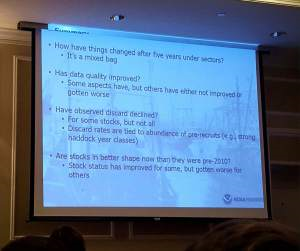 At this year’s Maine Fishermen’s Forum, many old themes are the topic of current conversations. Fisheries managers and scientists point to data that show a fishery resource squarely on the ropes, while many in the fishing industry maintain that there are more fishes in the water than any time in recent memory. Industry often views the current management system as one that forces fishers into a situation where they are “constantly trying not to catch fish” due to quotas imposed by managers based on science the industry views as suspect. The discrepancy between industry and managers–between anecdote and data–is troubling and continues to foment mistrust, frustration and outright anger. Read the rest here 13:19
At this year’s Maine Fishermen’s Forum, many old themes are the topic of current conversations. Fisheries managers and scientists point to data that show a fishery resource squarely on the ropes, while many in the fishing industry maintain that there are more fishes in the water than any time in recent memory. Industry often views the current management system as one that forces fishers into a situation where they are “constantly trying not to catch fish” due to quotas imposed by managers based on science the industry views as suspect. The discrepancy between industry and managers–between anecdote and data–is troubling and continues to foment mistrust, frustration and outright anger. Read the rest here 13:19
Scientists have routinely exaggerated the “evil twin of climate change” aka ocean acidification
 A new paper published in the ICES Journal of Marine Science puts the issue of “ocean acidification” to the test, and finds that there has been significant exaggeration in the issue. The paper is: Applying organized scepticism to ocean acidification research “Ocean acidification” (OA), a change in seawater chemistry driven by increased uptake of atmospheric CO2 by the oceans, has probably been the most-studied single topic in marine science in recent times. The majority of the literature on OA report negative effects of CO2 on organisms and conclude that OA will be detrimental to marine ecosystems. As is true across all of science, studies that report no effect of OA are typically more difficult to publish. Read the rest here 11:12
A new paper published in the ICES Journal of Marine Science puts the issue of “ocean acidification” to the test, and finds that there has been significant exaggeration in the issue. The paper is: Applying organized scepticism to ocean acidification research “Ocean acidification” (OA), a change in seawater chemistry driven by increased uptake of atmospheric CO2 by the oceans, has probably been the most-studied single topic in marine science in recent times. The majority of the literature on OA report negative effects of CO2 on organisms and conclude that OA will be detrimental to marine ecosystems. As is true across all of science, studies that report no effect of OA are typically more difficult to publish. Read the rest here 11:12
Is the clue to shrinking halibut in their stomachs — and those of arrowtooth flounder?
 Fish stomachs may help solve the mystery of why Alaska halibut today are so small for their age. Halibut weights are about a third of what they were 30 years ago, scientists have found. A culprit could be arrowtooth flounders, whose numbers have increased 500 percent over the same time to outnumber the most abundant species in the Gulf of Alaska — pollock. Fishermen for decades have claimed the toothy flounders, which grow to about 3 feet in length, are blanketing the bottom of the Gulf and many believe they are out-competing halibut for food. A study by Southeast Alaska researchers aims to find out. “People think that potentially arrowtooth are competing with halibut for space and/or prey,,, Read the rest here 10:04
Fish stomachs may help solve the mystery of why Alaska halibut today are so small for their age. Halibut weights are about a third of what they were 30 years ago, scientists have found. A culprit could be arrowtooth flounders, whose numbers have increased 500 percent over the same time to outnumber the most abundant species in the Gulf of Alaska — pollock. Fishermen for decades have claimed the toothy flounders, which grow to about 3 feet in length, are blanketing the bottom of the Gulf and many believe they are out-competing halibut for food. A study by Southeast Alaska researchers aims to find out. “People think that potentially arrowtooth are competing with halibut for space and/or prey,,, Read the rest here 10:04
2015 a half-billion dollar lobsterpalooza for Maine fishermen
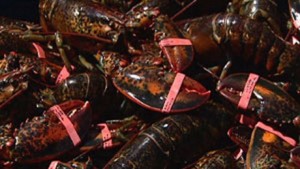 The Department of Marine Resources released its preliminary 2015 commercial fisheries landings Thursday night and the news was astonishing. According to DMR, the value of Maine’s commercially harvested marine resources topped $600 million in overall value in 2015. The total, $631,768,531, is an all-time high and an increase of more than $33 million over the previous record set in 2014. The largest single increase in value was in the state’s lobster fishery, which saw its total landed value jump by more than $37 million and the average per pound boat price increase by more than 10 percent, from $3.70 per pound in 2014 to $4.09 per pound last year. Read the rest here 08:59
The Department of Marine Resources released its preliminary 2015 commercial fisheries landings Thursday night and the news was astonishing. According to DMR, the value of Maine’s commercially harvested marine resources topped $600 million in overall value in 2015. The total, $631,768,531, is an all-time high and an increase of more than $33 million over the previous record set in 2014. The largest single increase in value was in the state’s lobster fishery, which saw its total landed value jump by more than $37 million and the average per pound boat price increase by more than 10 percent, from $3.70 per pound in 2014 to $4.09 per pound last year. Read the rest here 08:59
Southern New England Lobstermen Dispute Finding That Lobsters Are At Record Lows
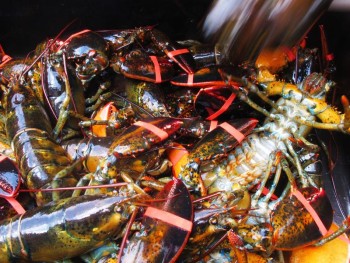 It’s been months since the Atlantic States Marine Fisheries Commission released its latest report on how lobsters are faring in the Atlantic Coast. But it’s still a hot topic among fishermen in the Ocean State. The latest lobster stock assessment found lobsters in the Gulf of Maine and Georges Bank are doing well; but lobsters in southern New England are not. Most southern New England fishermen disagree with that assessment, according to David Spencer, president of the and a lobster fisherman. Read the rest here 08:22
It’s been months since the Atlantic States Marine Fisheries Commission released its latest report on how lobsters are faring in the Atlantic Coast. But it’s still a hot topic among fishermen in the Ocean State. The latest lobster stock assessment found lobsters in the Gulf of Maine and Georges Bank are doing well; but lobsters in southern New England are not. Most southern New England fishermen disagree with that assessment, according to David Spencer, president of the and a lobster fisherman. Read the rest here 08:22
Northern California – Daily Salmon Count Predicts Grim Fishing Season
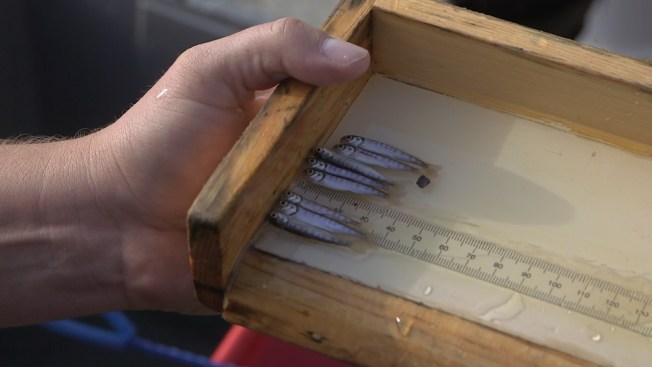 Every year about this time, state and federal fish regulators set recreational commercial fishing quotas for the upcoming salmon season which begins in April and May. The weighty decision is partially based on the number of salmon in the Sacramento River. The question is: How does anyone even know how many fish are actually in the river? The answer lies near the small Northern California town of Red Bluff, about a 45 minute drive from Shasta Dam. Beneath a diversion dam, giant metal buckets churn and rotate in the tide, scooping up anything heading down river — pointedly, tiny Chinook salmon fry making their way to the ocean. Video, Read the rest here 07:56
Every year about this time, state and federal fish regulators set recreational commercial fishing quotas for the upcoming salmon season which begins in April and May. The weighty decision is partially based on the number of salmon in the Sacramento River. The question is: How does anyone even know how many fish are actually in the river? The answer lies near the small Northern California town of Red Bluff, about a 45 minute drive from Shasta Dam. Beneath a diversion dam, giant metal buckets churn and rotate in the tide, scooping up anything heading down river — pointedly, tiny Chinook salmon fry making their way to the ocean. Video, Read the rest here 07:56
Almost 20 years ago, a big bust! – Cape Cod brothers, scallopers face possible $5.8 million fines
 In what officials say are the largest fisheries sanctions ever sought in the Northeast two Cape Cod brothers and their fleet of scallopers out of Fall River face proposed civil penalties of more than $5.8 million. The National Oceanic and Atmospheric Administration has cited James G. Spalt of Barnstable and Peter Spalt of Marston Mills their fish processing corporation Cape Spray Fisheries five fishing boats and 12 fishing captains for some 300 fisheries violations under the Magunson Fisheries Conservation and Management Act. “It certainly is the biggest (fine) in this region within anyone’s memory” said Terry Frady a public affairs spokesman for the National Marine Fisheries Service. Read the rest here – This is how it ended up, Brothers to pay $2 million to settle fishery fraud – Read the rest here 16:42
In what officials say are the largest fisheries sanctions ever sought in the Northeast two Cape Cod brothers and their fleet of scallopers out of Fall River face proposed civil penalties of more than $5.8 million. The National Oceanic and Atmospheric Administration has cited James G. Spalt of Barnstable and Peter Spalt of Marston Mills their fish processing corporation Cape Spray Fisheries five fishing boats and 12 fishing captains for some 300 fisheries violations under the Magunson Fisheries Conservation and Management Act. “It certainly is the biggest (fine) in this region within anyone’s memory” said Terry Frady a public affairs spokesman for the National Marine Fisheries Service. Read the rest here – This is how it ended up, Brothers to pay $2 million to settle fishery fraud – Read the rest here 16:42
Public asked to report illegal fishing on Coast Guard tip line following the big bust
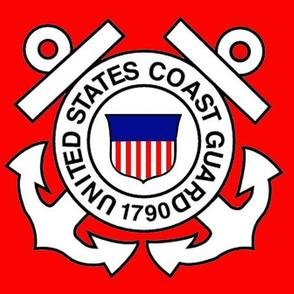 Days after the owner of a large-scale New Bedford fishing operation was arrested on federal charges that he has been falsifying records to conceal quota violations for years, the U.S. Coast Guard in Boston is asking the public to report illegal fishing by calling a toll-free tip line. A news release issued Wednesday said confidential tips can be left anonymously at (844) 847-2431. Petty Officer Andrew Barresi said Thursday that the tip line isn’t new, but the Coast Guard wanted “to really get out the word” to anyone who knows of illegal activity that “there’s a place that you can report it.” People who might call the number could be fishing boat captains, deck hands, family members, “anybody who sees something suspicious,” Barresi said. well, alrighty then! Read the rest here 16:05
Days after the owner of a large-scale New Bedford fishing operation was arrested on federal charges that he has been falsifying records to conceal quota violations for years, the U.S. Coast Guard in Boston is asking the public to report illegal fishing by calling a toll-free tip line. A news release issued Wednesday said confidential tips can be left anonymously at (844) 847-2431. Petty Officer Andrew Barresi said Thursday that the tip line isn’t new, but the Coast Guard wanted “to really get out the word” to anyone who knows of illegal activity that “there’s a place that you can report it.” People who might call the number could be fishing boat captains, deck hands, family members, “anybody who sees something suspicious,” Barresi said. well, alrighty then! Read the rest here 16:05
Maine’s 2015 lobster catch value jumps by $37 million
 The volume was down but the value was up for Maine’s 2015 total lobster haul, according to the Maine Department of Marine Resources. The estimated cumulative gross income for the statewide lobster fishing fleet increased from $458 million in 2014 to $495 million last year – a jump of $37 million, according to a press release issued Thursday night by DMR. It is the sixth year in a row that the estimated dockside value of Maine’s annual lobster harvest has hit an all-time high. And for the first time since 2007 — before the onset of the Great Recession — the average per-pound price that Maine fishermen were paid for their catch was more than $4. That average increased from $3.70 in 2014 to $4.09 in 2015, according to the release. Read the rest here 15:09
The volume was down but the value was up for Maine’s 2015 total lobster haul, according to the Maine Department of Marine Resources. The estimated cumulative gross income for the statewide lobster fishing fleet increased from $458 million in 2014 to $495 million last year – a jump of $37 million, according to a press release issued Thursday night by DMR. It is the sixth year in a row that the estimated dockside value of Maine’s annual lobster harvest has hit an all-time high. And for the first time since 2007 — before the onset of the Great Recession — the average per-pound price that Maine fishermen were paid for their catch was more than $4. That average increased from $3.70 in 2014 to $4.09 in 2015, according to the release. Read the rest here 15:09
Trawler can’t clear Ocean City Inlet, Smaller fishing vessel ferries catch
 Though an adjusted schedule hastens the arrival of the Currituck to dredge the commercially paralyzed Ocean City Inlet, at least one boat, the Instigator, has begun offloading its catch at the White Marlin Marina on Somerset Street in Ocean City. On Monday and Wednesday, the 80-foot trawler was forced to use the marina as a backup mooring location, unloading thousands of pounds of sea bass onto a smaller fishing boat, the Skilligalee, which hauled the catch from Ocean City to the commercial harbor in several trips. The catch was then processed normally as the smaller vessel reported no problems navigating the inlet. Read the rest here 14:42
Though an adjusted schedule hastens the arrival of the Currituck to dredge the commercially paralyzed Ocean City Inlet, at least one boat, the Instigator, has begun offloading its catch at the White Marlin Marina on Somerset Street in Ocean City. On Monday and Wednesday, the 80-foot trawler was forced to use the marina as a backup mooring location, unloading thousands of pounds of sea bass onto a smaller fishing boat, the Skilligalee, which hauled the catch from Ocean City to the commercial harbor in several trips. The catch was then processed normally as the smaller vessel reported no problems navigating the inlet. Read the rest here 14:42
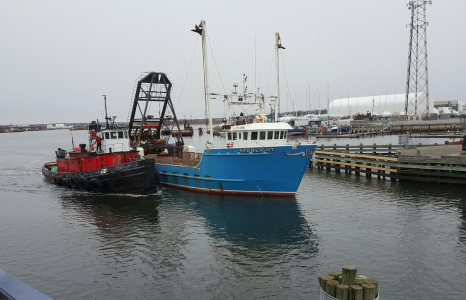
Just now! A tight fit.
What happened to the mullet? Fish is scarce in Lee County

Mississippi Oyster fishermen working once again as reefs re-open
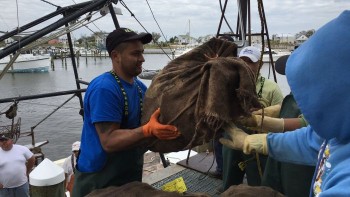 Fresh, Mississippi oysters are available once again now that oyster season re-opened at sunrise Thursday. After being closed since early December, oyster fishermen say they are happy to be working the reefs again. Boats loaded with sacks of fresh oysters arrived at the seafood docks in Pass Christian late Thursday morning. “Definitely happy to be back fishing again,” said fisherman, John Livings. Livings’ boat was among the first to unload its 25 sack limit. Soon, others were waiting in line at the docks. “They didn’t grow as much as we thought they was going to grow. At least we got to go to work and make our limit. So it’s good,” Livings explained. Read the rest here 10:25
Fresh, Mississippi oysters are available once again now that oyster season re-opened at sunrise Thursday. After being closed since early December, oyster fishermen say they are happy to be working the reefs again. Boats loaded with sacks of fresh oysters arrived at the seafood docks in Pass Christian late Thursday morning. “Definitely happy to be back fishing again,” said fisherman, John Livings. Livings’ boat was among the first to unload its 25 sack limit. Soon, others were waiting in line at the docks. “They didn’t grow as much as we thought they was going to grow. At least we got to go to work and make our limit. So it’s good,” Livings explained. Read the rest here 10:25
Keith Sullivan set the tone early at FFAW shrimp rally Thursday, railing against “that bullshit policy, LIFO”
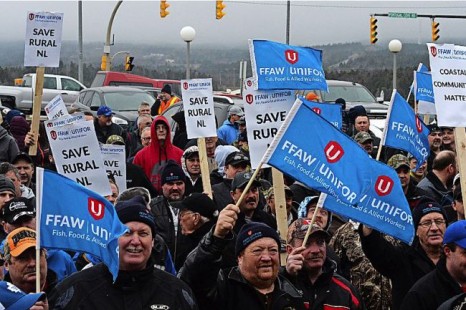 Fishermen’s union president Keith Sullivan set the tone early at a shrimp rally Thursday, railing against “that bullshit policy, LIFO” — last in, first out — and how it affects Newfoundland and Labrador harvesters. A little while later, when Fogo Island Mayor Andrew Shea suggested that some civil disobedience might be needed — breaking down doors, or tying up the big foreign freezer trawlers at the wharf — a harvester towards the back of the room shouted, “Come on, let’s go!” His friend leaned over and said to him, “In jail, you will be.” The first harvester replied, “I don’t give a f—.” Bill Broderick, a representative for the Fish, Food and Allied Workers (FFAW), reminded the crowd that non-violent political action is what they’re going for. Read the rest here 08:47
Fishermen’s union president Keith Sullivan set the tone early at a shrimp rally Thursday, railing against “that bullshit policy, LIFO” — last in, first out — and how it affects Newfoundland and Labrador harvesters. A little while later, when Fogo Island Mayor Andrew Shea suggested that some civil disobedience might be needed — breaking down doors, or tying up the big foreign freezer trawlers at the wharf — a harvester towards the back of the room shouted, “Come on, let’s go!” His friend leaned over and said to him, “In jail, you will be.” The first harvester replied, “I don’t give a f—.” Bill Broderick, a representative for the Fish, Food and Allied Workers (FFAW), reminded the crowd that non-violent political action is what they’re going for. Read the rest here 08:47
B.C. First Nation vows to stop herring roe fishery in its territory
 The Tla’amin First Nation has served notice that it will take action to halt any commercial herring roe fishery in its traditional territory. A band council resolution sent to the Department of Fisheries and Oceans (DFO) says a commercial fishery would cause “irreversible damage” to a herring stock that is just showing signs of recovery after a catastrophic collapse in the 1980s. “If the decision of Fisheries and Oceans Canada is to proceed with the commercial herring fishery, Tla’amin Nation will take steps to restrain the mismanagement of the fishery,” the resolution reads. A DFO manager alerted the band’s fisheries manager Kevin Timothy to the possibility of a commercial opening in waters near Powell River. Read the rest here 08:24
The Tla’amin First Nation has served notice that it will take action to halt any commercial herring roe fishery in its traditional territory. A band council resolution sent to the Department of Fisheries and Oceans (DFO) says a commercial fishery would cause “irreversible damage” to a herring stock that is just showing signs of recovery after a catastrophic collapse in the 1980s. “If the decision of Fisheries and Oceans Canada is to proceed with the commercial herring fishery, Tla’amin Nation will take steps to restrain the mismanagement of the fishery,” the resolution reads. A DFO manager alerted the band’s fisheries manager Kevin Timothy to the possibility of a commercial opening in waters near Powell River. Read the rest here 08:24
Squeezed Scallops Land High Prices
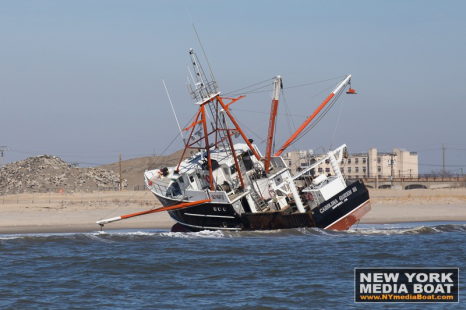 With her shrimp-colored outriggers and a home port of Seaford, Va., it wasn’t hard to wonder what a boat like Carolina Queen III was doing so far up north when she ran aground in a storm near Rockaway Inlet on Long Island last week. Turns out she was chasing the nation’s most lucrative fishery: sea scallops, which, in 2014, amounted to a $400 million market. “It’s a pretty mobile fleet,” said Deirdre Boelke, the sea scallop fishery analyst for the New England Fishery Management Council, explaining that the fishery spans an area from North Carolina to Maine, and that scallops prefer a depth of about 50 meters, or 150 feet. Read the rest here 07:43
With her shrimp-colored outriggers and a home port of Seaford, Va., it wasn’t hard to wonder what a boat like Carolina Queen III was doing so far up north when she ran aground in a storm near Rockaway Inlet on Long Island last week. Turns out she was chasing the nation’s most lucrative fishery: sea scallops, which, in 2014, amounted to a $400 million market. “It’s a pretty mobile fleet,” said Deirdre Boelke, the sea scallop fishery analyst for the New England Fishery Management Council, explaining that the fishery spans an area from North Carolina to Maine, and that scallops prefer a depth of about 50 meters, or 150 feet. Read the rest here 07:43
Speier, Huffman introduce disaster relief funding bill – The Crab Emergency Disaster Assistance Act of 2016
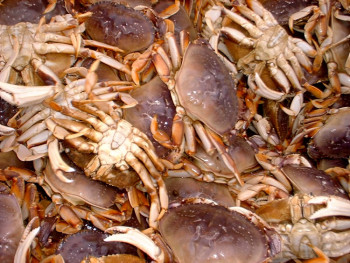 U.S. representatives will announce legislation that would provide California fishermen and businesses with $138 million in funding. The Crab Emergency Disaster Assistance Act of 2016 would provide $138.15 million in assistance to Dungeness and rock crab fishermen and related businesses. The funding is contingent on U.S. Secretary of Commerce Penny Pritzker declaring the state’s crab fishing industry a disaster and a commercial fishery failure. This comes after the shutdown of this year’s commercial crab season. The season was supposed to open on Nov. 17 but remained closed because of high levels of harmful acid in the crab. Read the rest here 07:21
U.S. representatives will announce legislation that would provide California fishermen and businesses with $138 million in funding. The Crab Emergency Disaster Assistance Act of 2016 would provide $138.15 million in assistance to Dungeness and rock crab fishermen and related businesses. The funding is contingent on U.S. Secretary of Commerce Penny Pritzker declaring the state’s crab fishing industry a disaster and a commercial fishery failure. This comes after the shutdown of this year’s commercial crab season. The season was supposed to open on Nov. 17 but remained closed because of high levels of harmful acid in the crab. Read the rest here 07:21
Carlos Rafael returns to work at Carlos Seafood on New Bedford’s waterfront
 Local fishing magnate Carlos Rafael, arrested a week ago on federal conspiracy and falsification charges then released from custody Wednesday on a $1 million bond, gave a simple statement Thursday when he returned a phone call. “Of course I’m working today,” he said, referring to his Carlos Seafood business. Rafael, his gravelly voice distinctive over the phone, declined to comment further — neither about the pending case nor about the highly valuable fishing permits and quotas he holds. Whether those quotas stay among fishermen in New Bedford’s port, or are sold elsewhere, could be a hugely significant question for the city’s fishing industry in coming months. “No comment at this time,” Rafael said. Read the rest here 20:52
Local fishing magnate Carlos Rafael, arrested a week ago on federal conspiracy and falsification charges then released from custody Wednesday on a $1 million bond, gave a simple statement Thursday when he returned a phone call. “Of course I’m working today,” he said, referring to his Carlos Seafood business. Rafael, his gravelly voice distinctive over the phone, declined to comment further — neither about the pending case nor about the highly valuable fishing permits and quotas he holds. Whether those quotas stay among fishermen in New Bedford’s port, or are sold elsewhere, could be a hugely significant question for the city’s fishing industry in coming months. “No comment at this time,” Rafael said. Read the rest here 20:52
Exclusive: Canada fisheries protest US-proposed IUU Fishing Enforcement Act Import Rules
 Fisheries in Canada and other countries are protesting new efforts by United States to curb illegal, unreported and unregulated (IUU) imports, arguing they already have documentation and other good fisheries management measures that are required in the new regulations and should not be required to go through the time and expense required to comply. Following the passage into law of the Illegal, Unreported and Unregulated Fishing Enforcement Act, which was approved unanimously by the U.S. Congress and signed by President Obama in 2015, the National Atmospheric and Oceanic Administration (NOAA) is seeking to align its rules regarding permitting and reporting requirements “to provide for traceability of seafood products offered for entry into the U.S. supply chain, and to ensure that these products were lawfully acquired,” Read the rest here 19:02
Fisheries in Canada and other countries are protesting new efforts by United States to curb illegal, unreported and unregulated (IUU) imports, arguing they already have documentation and other good fisheries management measures that are required in the new regulations and should not be required to go through the time and expense required to comply. Following the passage into law of the Illegal, Unreported and Unregulated Fishing Enforcement Act, which was approved unanimously by the U.S. Congress and signed by President Obama in 2015, the National Atmospheric and Oceanic Administration (NOAA) is seeking to align its rules regarding permitting and reporting requirements “to provide for traceability of seafood products offered for entry into the U.S. supply chain, and to ensure that these products were lawfully acquired,” Read the rest here 19:02
FFAW-Unifor wants all of Area 6 shrimp quota for inshore fleet
 Union, members say boats, fish plants, whole communities to die out if no change made to policy The FFAW-Unifor held a press conference in St. John’s this morning, trying to maintain public attention on the plight faced by the people and communities with a stake in the northern shrimp fishery. Fear amongst harvesters, plant workers, plant owners, truckers, other rural service providers is reaching fever pitch, following word to the northern shrimp advisory committee of a significant drop in shrimp stocks in fishing area six (A6) — As a result of the existing Fisheries policy of Last In First Out (LIFO), the bulk of expected quota cuts (some 90 per cent) will go to the inshore fleet and local plants. Read the rest here 15:40
Union, members say boats, fish plants, whole communities to die out if no change made to policy The FFAW-Unifor held a press conference in St. John’s this morning, trying to maintain public attention on the plight faced by the people and communities with a stake in the northern shrimp fishery. Fear amongst harvesters, plant workers, plant owners, truckers, other rural service providers is reaching fever pitch, following word to the northern shrimp advisory committee of a significant drop in shrimp stocks in fishing area six (A6) — As a result of the existing Fisheries policy of Last In First Out (LIFO), the bulk of expected quota cuts (some 90 per cent) will go to the inshore fleet and local plants. Read the rest here 15:40
Death of Four Ladies Captain Larry Wayne Sears blamed on poor planning, open stern
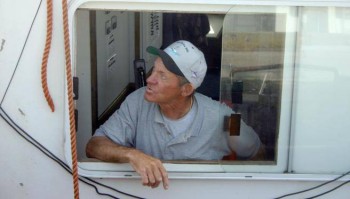 Lack of preparedness and poor adherence to regulations contributed to a fishing death off Cape Sable Island last year, according to a Transportation Safety Board investigation. On March 9, 64-year-old Shag Harbour captain Larry Wayne Sears went overboard on the Four Ladies 2003 fishing vessel and died. According to the TSB, Sears was trying to haul in another lobster trap and anchor that had fallen off the vessel when stacked lobster traps toppled onto the main deck, knocking him off. Sears was wearing a personal flotation device at the time, and the two crew members tried, unsuccessfully, to get him out of the 3 Celsius water and back onto the boat. Read the rest here 15:15
Lack of preparedness and poor adherence to regulations contributed to a fishing death off Cape Sable Island last year, according to a Transportation Safety Board investigation. On March 9, 64-year-old Shag Harbour captain Larry Wayne Sears went overboard on the Four Ladies 2003 fishing vessel and died. According to the TSB, Sears was trying to haul in another lobster trap and anchor that had fallen off the vessel when stacked lobster traps toppled onto the main deck, knocking him off. Sears was wearing a personal flotation device at the time, and the two crew members tried, unsuccessfully, to get him out of the 3 Celsius water and back onto the boat. Read the rest here 15:15
Alaska: Proposed measures seek fishing dollars as legislators continue digging into the industry for revenue
 Gov. Bill Walker’s commercial fisheries tax bill is stalled in committee, but legislators continue digging into the industry for revenue. Two bills, sponsored by legislators from the Matanuska-Susitna Borough, would impose new taxes on either the entire industry or the longliners and trawlers in the federal and state fisheries. HB 358, sponsored by Rep. Mark Neuman, R-Big Lake, and Rep. Les Gara, D-Anchorage, would require non-salmon and non-halibut trawlers and longliners to pay a tax on halibut and salmon bycatch. The bill was passed to the House Fisheries Committee on Feb. 24 but has not yet been scheduled for a hearing. On the same day, Rep. Scott Kawasaki, D-Fairbanks, signed as a bill cosponsor. Read the rest here 11:42
Gov. Bill Walker’s commercial fisheries tax bill is stalled in committee, but legislators continue digging into the industry for revenue. Two bills, sponsored by legislators from the Matanuska-Susitna Borough, would impose new taxes on either the entire industry or the longliners and trawlers in the federal and state fisheries. HB 358, sponsored by Rep. Mark Neuman, R-Big Lake, and Rep. Les Gara, D-Anchorage, would require non-salmon and non-halibut trawlers and longliners to pay a tax on halibut and salmon bycatch. The bill was passed to the House Fisheries Committee on Feb. 24 but has not yet been scheduled for a hearing. On the same day, Rep. Scott Kawasaki, D-Fairbanks, signed as a bill cosponsor. Read the rest here 11:42
More Maine lobstermen to carry fed observers – mandatory for fishermen as a condition of their federal permit
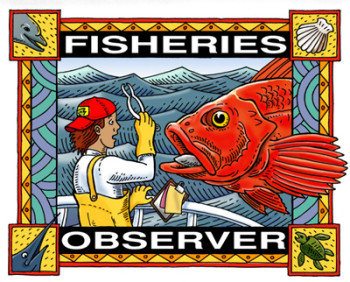 Any Maine lobsterman with a federal lobster permit may now be contacted by federal fishery observers asking to send a representative on his or her boat for a day. That was the message from Maine Department of Marine Resources lobster scientist Kathleen Reardon to fishermen at a Zone B council meeting last week. If asked, hosting the observer is . The Northeast Fisheries Observer Program (NEFOP) has been in the news this year over disputes about who pays to send observers on commercial fishing boats, but that controversy has been in the groundfish industry. Read the rest here 10:35
Any Maine lobsterman with a federal lobster permit may now be contacted by federal fishery observers asking to send a representative on his or her boat for a day. That was the message from Maine Department of Marine Resources lobster scientist Kathleen Reardon to fishermen at a Zone B council meeting last week. If asked, hosting the observer is . The Northeast Fisheries Observer Program (NEFOP) has been in the news this year over disputes about who pays to send observers on commercial fishing boats, but that controversy has been in the groundfish industry. Read the rest here 10:35
American Samoa – Tri Marine says return of tuna boats good for everyone
 Tri Marine International’s ten U.S. flag Cape fleet vessels and other U.S. flag boats based in American Samoa are once again allowed access to their historic fishing grounds in the Western and Central Pacific. This comes after nearly two months of being locked out by failed treaty negotiations.Don Binotto CEO of STP and the tuna Store says “This is welcome news not only for our fleet and our business, but to the many families in American Samoa that depend on a tuna-based economy, including the 2,000 employees we aim to have working when we are at capacity at Samoa Tuna Processors (STP).” Read the rest here Hallman: Fishing deal finalized, fees transmitted to FFA Read the rest here 09:42
Tri Marine International’s ten U.S. flag Cape fleet vessels and other U.S. flag boats based in American Samoa are once again allowed access to their historic fishing grounds in the Western and Central Pacific. This comes after nearly two months of being locked out by failed treaty negotiations.Don Binotto CEO of STP and the tuna Store says “This is welcome news not only for our fleet and our business, but to the many families in American Samoa that depend on a tuna-based economy, including the 2,000 employees we aim to have working when we are at capacity at Samoa Tuna Processors (STP).” Read the rest here Hallman: Fishing deal finalized, fees transmitted to FFA Read the rest here 09:42
“Woo hoo,” A Win for the Good Guys! Scallop harvesters victorious in lawsuit against FFAW
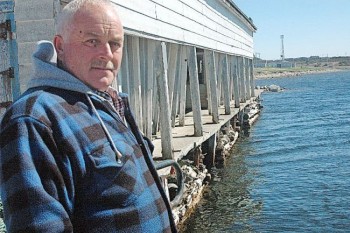 “Woo hoo,” was his first reaction when asked about the decision favouring scallop harvesters over their union FFAW. Moores is an active fish harvester. Over the past few years he has focused on the crab and turbot fishery, but will be returning to scallops the upcoming season. “I’m very pleased with the conclusion.” A judge in St. John’s ruled in favour of harvesters Feb. 29 after a 2014 dispute planted them against the FFAW. A section of the Strait of Belle Isle along the coast of Labrador was no longer going to be viable for scallop harvesting. The area is going to be used by Nalcor Energy for a cable for the Muskrat Falls project. It totaled about 45 square kilometres. Read the rest here 08:51
“Woo hoo,” was his first reaction when asked about the decision favouring scallop harvesters over their union FFAW. Moores is an active fish harvester. Over the past few years he has focused on the crab and turbot fishery, but will be returning to scallops the upcoming season. “I’m very pleased with the conclusion.” A judge in St. John’s ruled in favour of harvesters Feb. 29 after a 2014 dispute planted them against the FFAW. A section of the Strait of Belle Isle along the coast of Labrador was no longer going to be viable for scallop harvesting. The area is going to be used by Nalcor Energy for a cable for the Muskrat Falls project. It totaled about 45 square kilometres. Read the rest here 08:51
Shaheen Puts Focus of Senate Hearing on New Hampshire’s Struggling Fishing Industry with EDF!
 Washington, DC—Senator Jeanne Shaheen (D-NH), the lead Democrat on the Senate Small Business and Entrepreneurship Committee, has invited two prominent industry leaders in the New England fishing industry to testify at a committee hearing scheduled for Thursday. Through her leadership on the committee, Senator Shaheen was able to make New Hampshire’s struggling fishing industry a major focus of Thursday’s hearing. James Hayward of Portsmouth and Dr. Joshua Wiersma will testify at the hearing entitled “The Impacts of Federal Fisheries Management on Small Businesses” and can be watched online here beginning at 10:00AM. Read the rest here To Watch click here The Impacts of Federal Fisheries Management on Small Businesses 07:43
Washington, DC—Senator Jeanne Shaheen (D-NH), the lead Democrat on the Senate Small Business and Entrepreneurship Committee, has invited two prominent industry leaders in the New England fishing industry to testify at a committee hearing scheduled for Thursday. Through her leadership on the committee, Senator Shaheen was able to make New Hampshire’s struggling fishing industry a major focus of Thursday’s hearing. James Hayward of Portsmouth and Dr. Joshua Wiersma will testify at the hearing entitled “The Impacts of Federal Fisheries Management on Small Businesses” and can be watched online here beginning at 10:00AM. Read the rest here To Watch click here The Impacts of Federal Fisheries Management on Small Businesses 07:43
Missing shrimp boat and captain found
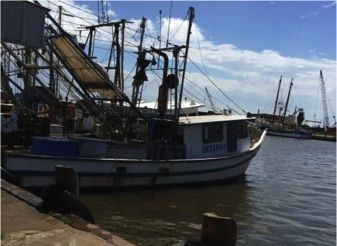 A small shrimp boat bound from Abbeville to Biloxi was located Monday afternoon, Coast Guard officials said, after it went missing for nearly a week. Two people were on board the 28-foot Tina H when it was found, about 17 miles south of Biloxi, and hoisted to safety. They were taken to the Naval Air Station at Belle Chasse. They were reported to be in good health. The vessel remains anchored in ocean waters. Rescuers were searching Gulf waters from mid-Louisiana to Biloxi in search of the boat, which had last been seen Abbeville Feb. 23 Read the rest here 22:54
A small shrimp boat bound from Abbeville to Biloxi was located Monday afternoon, Coast Guard officials said, after it went missing for nearly a week. Two people were on board the 28-foot Tina H when it was found, about 17 miles south of Biloxi, and hoisted to safety. They were taken to the Naval Air Station at Belle Chasse. They were reported to be in good health. The vessel remains anchored in ocean waters. Rescuers were searching Gulf waters from mid-Louisiana to Biloxi in search of the boat, which had last been seen Abbeville Feb. 23 Read the rest here 22:54


































